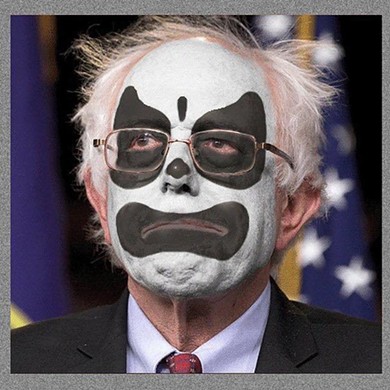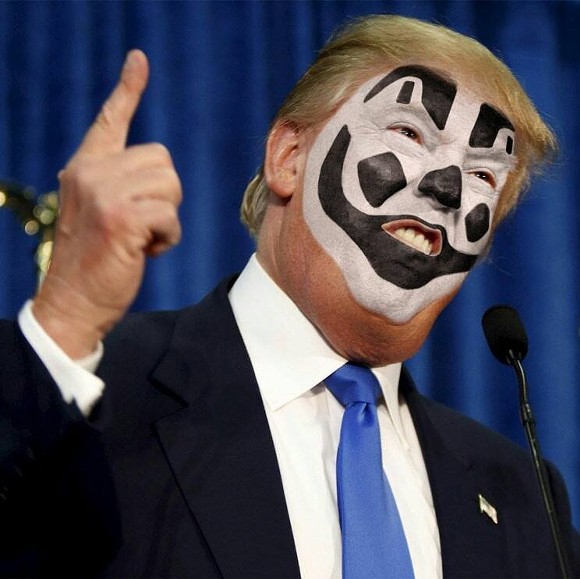A year after launching his presidential campaign to dismantle a clubby "Washington cartel" of money and influence, the Texas senator is now the only man standing between the party's snake-bitten leadership and a hostile takeover by Donald Trump.
at Trump could be headed for the nomination, even as the polls tighten and the maverick billionaire descends into ever more coarse attacks on Twitter - the most recent featuring an unflattering photo of Cruz's wife Heidi.
The nasty feud - culminating in Trump's tweet juxtaposing his supermodel wife with the photo of Heidi Cruz - has only further estranged GOP elites who fear he is alienating women, young people and minorities, dragging the party into an electoral flameout in the fall.
The episode, dubbed "wifegate," appeared to be retaliation for an anti-Trump Super PAC ad using 15-year-old images of Trump's wife, Melania, in a nude photo shoot for British GQ.
Shifting strategy
Adding to the sense of crisis was a National Enquirer story based on anonymous sources implicating Cruz in a series of extramarital affairs. The Texas senator flatly denied the story and labeled it a Trump smear.
"It is garbage, complete and utter lies," Cruz told reporters Friday in Wisconsin, where he was campaigning. "It is a tabloid smear and it has come from Donald Trump and his henchmen."
Trump denied any involvement in the story. "Ted Cruz's problem with the National Enquirer is his and his alone," Trump said.
The ongoing dust-up comes as the Republican primary schedule enters a lull - the next contest is in Wisconsin on April 5, followed by New York on the 19th. It has allowed both leading candidates to shift from a singular focus on voters to a strategy of cultivating inside players to generate the momentum needed to break the 1,237-delegate barrier to win the nomination - especially if no candidate gets a majority by July and it breaks into a rare contested convention.
"The campaigns that are still viable would be well advised to start preparing for the convention," said James McGrath, a veteran GOP strategist in Houston with long ties to the Bush family.
The quaint retail politics of Iowa and New Hampshire are now a gauzy memory.
Trump, whose populist campaign has fed off huge rallies and media buzz, did something unprecedented at the start of the week: He met with lawmakers in Washington and gave a scripted speech where he relied on Teleprompters to deliver carefully parsed phrases on foreign policy.
"Trump's been the master of reinvention," said California GOP strategist Sal Russo, a Tea Party Express leader who worked on Ross Perot's 1992 campaign. "Are we going to see a more responsible, more presidential candidate?"
Cruz backers don't think so. Cruz spokeswoman Alice Stewart, commenting on the Twitter feud over the candidates' wives, called Trump's attacks "conduct unbecoming" of a presidential candidate.
But even as he brawls publicly with Trump, behind the scenes Cruz and his aides are focused on the inside game of shepherding supporters through the intricate party machinery of delegate selection.
Each candidate is playing to his strengths. Trump is using his salesman's bravado in personal settings on Capitol Hill to wear down official party resistance. Cruz, deeply distrusted by his Senate colleagues, is relying on the organization skills of his activist base inside the party.
Their objectives are mutually exclusive: Each needs to unify a fractured party, or at least enough of it to get the delegates required to win.
Neither would be the establishment's top pick. "They're pinching their noses, the same way I pinched my nose when I voted for Trump," said Florida GOP consultant Chris Ingram.
The third candidate standing, Ohio Gov. John Kasich, has managed to win only his home state and has no mathematical chance of winning enough delegates to become the Republican nominee.
'He's not Trump'
That makes Cruz the face of the Stop Trump movement. The tea party hero remains the next-closest thing to a Washington outsider and Trump's closest rival in the all-important delegate count.
"The ironies abound," said Geoffrey Skelley, an analyst at the University of Virginia's Center for Politics. "It suggests they're trying to rally around the candidate who has the best shot at stopping Trump, and I think it's definitely Cruz."
Punctuating the political force field developing around Cruz is a new $1 million ad campaign by the anti-tax Club for Growth, the political action committee of which never before has endorsed in a presidential race.
"Your choice comes down to this. Math," a narrator says. "Only Ted Cruz can beat Donald Trump. John Kasich can't do it."
The ad is starting this weekend in Wisconsin, where 42 delegates are at stake. Cruz, looking for a bounce in the race, has spent three days campaigning in Wisconsin over the past week.
Beltway Republicans who remember Cruz's leading role in the 2013 government-shutdown to block Obamacare still have been slow to come around. South Carolina U.S. Sen. Lindsey Graham, who likened the Trump-Cruz rivalry as a choice between being "shot or poisoned," has now decided to back Cruz.
Why? "He's not Trump," Graham said last week on "The Daily Show with Trevor Noah," while struggling to give a full-throated endorsement of Cruz. Acknowledging his reluctance, he said, "I'm getting better at this."
While Graham called Cruz his "15th choice," Bush brother Neil Bush gave only a slightly less backhanded endorsement in a CNN interview. "Ted Cruz wasn't my second or third choice," Neil Bush said. "I don't particularly like his style. He went to Washington to be disruptive. He clearly did that and he's lost a lot of friends in Washington. [But] he'll rebuild friendships when he becomes president."
Neil Bush, like others in the party's anti-Trump faction, have made clear that it's now a binary decision based on a cold strategic calculation.
"Even the folks who were not that comfortable with Ted Cruz when he was working the Senate fighting Obamacare realize that he's got the best chance for them to win the White House, or at least make it close," said Club for Growth President David McIntosh.
Reaction to acrimony
A number of polls give Cruz a decided edge over Trump in a hypothetical matchup against Clinton, though the many polls also show Clinton beating both. Of the three Republicans left, only Kasich beat Clinton in a new Monmouth University poll.
But some of the movement toward Cruz also is a reaction to the acrimony and violence surrounding the Trump campaign. Jeb Bush, while praising Cruz as a "consistent, principled conservative," also spelled out what he sees as the danger in a Trump candidacy.
"For the sake of our party and country," Jeb Bush said, "we must move to overcome the divisiveness and vulgarity Donald Trump has brought into the political arena."
For Cruz, the risk of being cast as an establishment favorite is offset by the suspicions of conservative supporters who point to Trump's past record of supporting liberal politicians and causes. For conservatives, if Cruz is not the face of the anti-Trump movement, he's the only vehicle they have left.
"He's just the guy that's there that's a strong conservative, that has won a bunch of states, has a real organization, has raised money, and run a really good campaign," said Austin Barbour, who has served as a strategist for former Texas Gov. Rick Perry and later for Jeb Bush.
The tepid establishment endorsements might also minimize any downside for Cruz with his disenchanted base. "Frankly, I don't think that it hurts Senator Cruz to have a lot of, quote-unquote, establishment figures say 'I'm going to support him, but I don't love him,' " McGrath said.
Meanwhile, those endorsements also are opening new doors for the money that will be needed to take on the largely self-funding real estate mogul and reality TV star.
"I know it didn't go unnoticed among the network of donors and grassroots supporters who were working very hard for Jeb," McGrath said. "Throughout the extended Bush political family, there's no doubt that Jeb's endorsement is going to carry a lot of weight."








